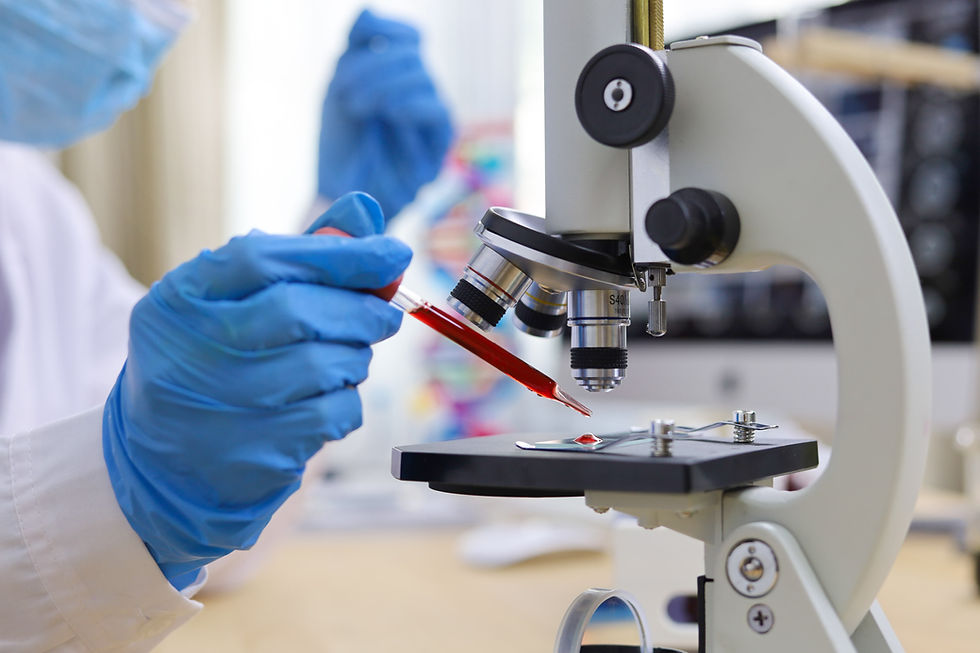Soak Up the Sunshine Vitamin: Why Vitamin D Matters for You
- Jul 22, 2025
- 3 min read
Updated: Aug 3, 2025

Ever wonder why everyone’s talking about “the sunshine vitamin”? Vitamin D is one of the unsung heroes of good health—yet so many of us don’t get enough. In this post, we’ll dive into why Vitamin D is so important, how to know if you’re low, and simple ways to bump up your levels (without having to move to the tropics!).
What Exactly Is Vitamin D?
Vitamin D is a fat‑soluble vitamin that behaves more like a hormone in your body. It helps regulate how your cells grow, keeps your bones strong, and even gives your immune system a boost. Think of it as the friendly watchman that makes sure several key systems in your body work smoothly.
1. Building Strong Bones and Teeth
Calcium’s Best Friend
Vitamin D tells your intestines to absorb calcium from the foods you eat. Without it, most of that calcium just passes right through—and low calcium means weak bones.
Preventing Osteoporosis
Over time, Vitamin D deficiency can lead to brittle bones, fractures, and pain. Keeping your levels in the sweet spot helps you age gracefully (and stay active!).
2. Supercharging Your Immune System
Natural Defender
From warding off colds to helping your body fight infections, Vitamin D supports the “innate” side of your immunity—the first responders on duty whenever a germ shows up.
Mood Lifter
There’s growing evidence that Vitamin D influences the production of serotonin—the “feel‑good” chemical in your brain. That’s why a little extra D in the darker months can help chase away the winter blues.
3. Beyond Bones and Bugs: Other Surprising Benefits
Heart Health:
Some research suggests Vitamin D helps maintain healthy blood pressure and supports a strong cardiovascular system.
Muscle Function:
Adequate levels help keep muscles strong and reduce the risk of falls—especially important as we get older.
Brain Support:
Emerging studies link good Vitamin D status to sharper focus and potentially lower risk of cognitive decline.
How Do I Know If I’m Low?

Many people are quietly deficient, because mild symptoms—like fatigue, muscle aches, or low mood—can be easily dismissed. The most reliable way to check is a simple blood test called 25‑hydroxyvitamin D. Aim for levels between 30–50 ng/mL, though you and your practitioner can decide what’s right for you.
Your Go‑To Sources of Vitamin D
1. Sunlight
The Natural Route: Just 10–30 minutes of midday sun, a few times per week, can help many people make enough D. (Darker skin tones or higher latitudes may need more time.)
Smart Sun Habits: Always balance sun exposure with skin protection—short, unprotected bursts are generally safe, but longer sunbathing sessions call for sunscreen afterward.
2. Food
Fatty Fish: Salmon, mackerel, sardines—aim for two servings per week.
Fortified Foods: Many milks (cow’s, plant‑based), orange juice, cereals, and yogurts now come fortified with Vitamin D.
Egg Yolks & Mushrooms: Small amounts, but every bit helps!
3. Supplements
When to Supplement: If you live in a place with long winters, spend most of your day indoors, or your blood test shows low levels, a Vitamin D supplement is a convenient way to top up.
Dosage Tips: Typical maintenance doses range from 1,000–2,000 IU/day, but higher doses (under medical supervision) may be needed if you’re deficient.
Practical Tips for Boosting Your D
Sun Ritual: Take your mid‑day coffee break outside—no sunglasses, no sunscreen for just 10 minutes.
Fish Fridays: Make salmon tacos or smoked sardine toast a regular weekend treat.
Fortified Breakfast: Swap plain cereal for one fortified with D, or blend your morning smoothie with fortified almond milk.
Monthly Check‑In: Set a calendar reminder to revisit your D levels every 6–12 months.
Wrapping Up: Your Health’s Bright Spot
Vitamin D might sound like just another health buzzword, but it truly affects so many parts of your well‑being—from your bones and muscles to your mood and immunity. With a few simple changes—soaking up a little sunshine, eating D‑rich foods, or adding a supplement—you can help your body operate at its very best.
Ready to make the sunshine vitamin a daily habit? Your future self (and your cells!) will thank you.




Comments